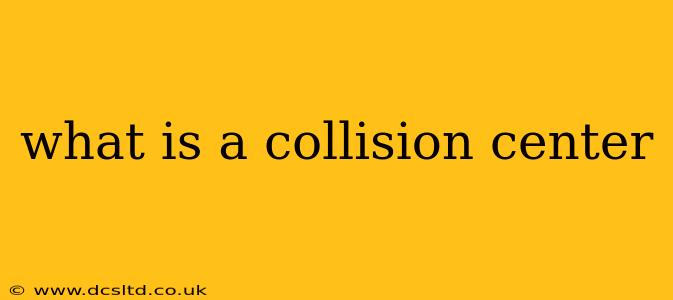A collision center, also known as an auto body repair shop or collision repair facility, is a specialized business dedicated to repairing vehicles damaged in accidents. These centers handle everything from minor dents and scratches to extensive frame damage, restoring vehicles to their pre-accident condition. They employ skilled technicians and utilize advanced technology to ensure safe and high-quality repairs.
Unlike a general mechanic who focuses on engine and mechanical issues, collision centers specialize in the structural and cosmetic aspects of vehicle repair. This means they're experts in restoring a vehicle's body, paint, and interior to factory standards.
What Services Do Collision Centers Offer?
Collision centers offer a wide range of services, including:
- Damage Assessment: A thorough inspection to determine the extent of the damage. This often involves using sophisticated measuring tools to check for frame damage.
- Frame Repair: Straightening bent or damaged frames using specialized equipment. This is crucial for maintaining the vehicle's structural integrity and safety.
- Body Repair: Replacing or repairing damaged body panels, including doors, fenders, hoods, and bumpers. This often involves welding, panel beating, and filling techniques.
- Painting: Matching the original vehicle color and applying a high-quality paint finish to blend seamlessly with the rest of the vehicle.
- Mechanical Repair: While not the primary focus, some centers also handle minor mechanical repairs related to the accident.
- Parts Procurement: Sourcing and ordering original equipment manufacturer (OEM) parts or high-quality aftermarket replacements.
- Insurance Claims Assistance: Many centers assist customers with their insurance claims, providing estimates and communicating with insurance adjusters.
How Do I Choose a Reputable Collision Center?
Choosing the right collision center is critical for ensuring your vehicle is repaired correctly and safely. Consider these factors:
- Certifications and Accreditation: Look for centers certified by organizations like I-CAR (Inter-Industry Conference on Auto Collision Repair) which demonstrates their commitment to training and quality.
- Customer Reviews: Check online reviews on sites like Google, Yelp, and others to see what previous customers have said about their experiences.
- Insurance Company Relationships: A good collision center will have established relationships with major insurance companies, streamlining the claims process.
- Warranty: Inquire about the warranty offered on repairs to ensure your peace of mind.
- Transparency: A reputable center will be transparent about the repair process, providing regular updates and explaining any necessary procedures.
What is the Difference Between a Collision Center and a Body Shop?
While the terms are often used interchangeably, there can be subtle differences. A "body shop" might be a smaller, less specialized operation. A collision center typically implies a larger facility with more advanced equipment and expertise in handling complex repairs. However, many excellent independent body shops also provide high-quality work.
What are the Typical Costs of Collision Repair?
The cost of collision repair varies greatly depending on the extent of the damage, the make and model of the vehicle, and the repair facility's location and labor rates. Minor repairs may cost a few hundred dollars, while major repairs can easily reach several thousand. It's always best to get multiple estimates from different collision centers before making a decision.
Does Insurance Cover Collision Repair?
Most comprehensive and collision insurance policies cover repairs to vehicles damaged in accidents. However, the coverage amount and the deductible will vary depending on your policy. It's essential to understand your insurance coverage and contact your insurance company to report the accident and initiate the claims process. Your collision center can assist with this process.
How Long Does Collision Repair Take?
Repair times vary depending on the complexity of the damage and the availability of parts. Minor repairs may be completed in a few days, while major repairs could take several weeks. Your collision center will provide an estimated completion time during the initial assessment.
Choosing the right collision center is crucial for the safety and value of your vehicle after an accident. By considering the factors discussed above, you can ensure that your vehicle receives the best possible care and repair.
